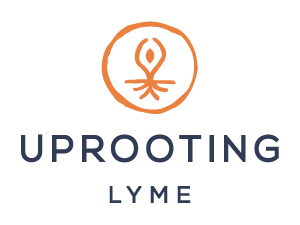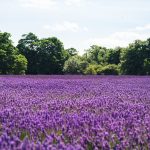
Baical Skullcap: A Stellar Herb for Chronic Infection & Immune Mediation
Baical skullcap, Scutellaria baicalensis for the scientists among us, or huang qin as we know it in Chinese herbalism, is a potent herbal ally for our times. The species name baicalensis signifies that botanists first described it from plants collected near Lake Baikal in Siberia.
Employed by Chinese herbalists for centuries, scutellaria is found in formulas from as long ago as the 2nd century AD. It is one of the top 50 most commonly used herbs from the Chinese materia medica.
Because our clinic often works with issues of immune dysregulation, chronic infection, and inflammation of all kinds, this herb is indispensable to our pharmacy. Read on to learn how we use it!
Historical Usage
According to traditional Chinese medicine, scutellaria clears heat (inflammation) and toxicity from the large intestine, liver and lungs. It has a bitter taste, a drying quality, and a cold temperature (energetically), which means that it acts like an antibiotic by fighting infection, reducing fever, and clearing the redness, swelling, and pain that are the hallmarks of the inflammatory process.
Baical skullcap is antiviral, antibacterial, anti-fungal, and anti-inflammatory. It is commonly called upon in Chinese herbal formulas to treat such varying diseases as hepatitis, gut infections, urinary tract infections, traumatic injury, bacterial skin conditions and acne, snake and insect bites, chronic infections of the eyes, ears and throat, headaches, atherosclerosis, cancer, and hypertension.
While it’s challenging for Western-minded folks to see how so many varied conditions could be treated by a single herb, it’s helpful to understand that in the Chinese herbal medicine tradition, baical skullcap is combined with other herbs to accentuate a particular action or focus.
For example, Chinese scutellaria is used in combination with bupleurum root (chai hu) for the treatment of malaria and other infections (viral or bacterial) that are lingering and not resolving quickly.
It is used with houttuynia (yu xing cao) to treat pneumonia, bronchitis, or other lung infection. Additional herbs would be selected to assist with clearing phlegm or moistening dryness to aid in the healing the lung tissue as the individual situation requires.
For gut inflammation, skullcap is typically combined with other anti-inflammatory herbs (such as coptis), as well as herbs that regulate bowel movement (to control diarrhea or alleviate constipation as needed), and additional herbs to reduce food stagnation, gas and bloating (such as hawthorn berry, betel nut, and poria mushroom).
Scientific Research
There is a plethora of well-done scientific research on baical skullcap. We now know that this root contains a multitude of medicinal chemical constituents, including flavonoids, saponins, alkaloids, glycosides, volatile oils and tannins. It has specifically been shown to block replication of viruses, candida, Streptococcus, Staphylococcus and other infectious bacteria.
With regards to Lyme disease, in a recent study that investigated the antimicrobial effects of numerous herbs against Borrelia burgdorferi (the bacteria that causes Lyme disease), Scutellaria baicalensis was among the most effective.
Baicalin, baicalein, scutellarin, wogonin, oroxylin A and Skullcapflavone II are thought to be the major active chemical compounds. They are strong antioxidants, lipoxygenase inhibitors, anti-inflammatory, and anti-coagulant. Baicalein and baicalin also decrease blood cholesterol.
It has been demonstrated to have neuro-protective effects both in vivo and in vitro from lethal cell damage due to lack of blood flow. The plant’s compounds directly scavenge and quench free radicals and protect cellular and mitochondrial membranes. Baicalin also improves the cellular repair potential of DNA.
Scutellaria has strong anti-inflammatory actions and may be used in acute bacterial or viral infection of the respiratory system (or elsewhere) with fever. It binds inflammatory cytokines (IL-1, IL-6 and TNF-alpha), and blocks and inhibits various other inflammatory pathways. This makes it a highly relevant herb for treatment of chronic inflammatory conditions as well.
It inhibits angiogenesis (the growth of new blood vessels) involved in cancer tumor growth. It also breaks up tiny blood clots that occur due to inflammation in the brain, protects the cells that line the blood vessels, and helps prevent platelet aggregation – thus aiding treatment of conditions such as viral or Lyme encephalitis, dementia, and Covid because it helps to prevent blood coagulation and cytokine storm.
It is also helpful for allergies and mast cell activation syndrome as it helps prevent histamine release from mast cells.
Growing Chinese Skullcap
If you’re local to Kingston, NY or travelling through the Hudson Valley, come meet baical skullcap in person at our humble but fast-growing Community Medicine Garden. Bareroot Chinese skullcap was just planted this spring, so fingers crossed she’ll be sending up shoots in no time! Baical skullcap herb grows just a foot or so high, with long roots that are yellow on the inside. That yellow color is characteristic of the medicinal alkaloids that make it a potent herbal antibiotic and immune mediator – similar to other yellow-colored roots such as goldenseal, Coptis, barberry and Oregon grape root.
Preparations:
Skullcap can be taken internally through a decoction (strong tea), granule (freeze-dried extract), tincture, or applied topically. It is easily absorbed by the digestive tracts and is known to cross the blood brain barrier. High quality options are available through our pharmacy, Bloom & Reveal Botanicals, at bloomreveal.com. Send us a query if you don’t see what you’re looking for! We have an extensive pharmacy and many items are not on the website.
Safety & Precautions:
Scutellaria is nontoxic and has an excellent safety record (LD50 = none). The American Herbal Products Association gave baical skullcap a Class 1 rating, meaning that it is safe when used appropriately. There are no known drug interactions, which makes it acceptable for people who are taking other medications. It is has been used in pregnancy to treat chronic infection without adverse effects. It is ideal to consult with a knowledgeable herbalist to receive the most out of taking scutellaria and the formulations that contain it.
Contact us at info@noulifehealth.com today if you would like support with integrating herbs into your treatment plan!
Sources:
- Feng Jie, et al. Evaluation of Natural and Botanical Medicines for Activity Against Growing and Non-growing Forms of B. burgdorferi. Frontiers in Medicine, vol. 7, 2020. https://www.frontiersin.org/article/10.3389/fmed.2020.00006
- Ho MW, Li TM, Li JP, Chiou JS, Chiu ML, Chen CJ, Cheng CF, Tsai FJ, Wu YC, Lin TH, Liao CC, Huang SM, Lin YN, Chou CH, Liang WM, Lin YJ. Chinese Herbal Medicine Usage Reduces Overall Mortality in HIV-Infected Patients With Osteoporosis or Fractures. Front Pharmacol. 2021 Apr 16;12:593434. doi: 10.3389/fphar.2021.593434. PMID: 33935696; PMCID: PMC8085888.
- Liao H, Ye J, Gao L, Liu Y. The main bioactive compounds of Scutellaria baicalensis Georgi. for alleviation of inflammatory cytokines: A comprehensive review. Biomed Pharmacother. 2021 Jan;133:110917. doi: 10.1016/j.biopha.2020.110917. Epub 2020 Nov 17. PMID: 33217688.
- Lin, Baowan. Integrating Comprehensive and Alternative Medicine into Stroke: Herbal Treatment of Ischemia, Ch 12. https://doi.org/10.1016/B978-0-12-374228-5.00012-3
- Marshall AC. Traditional Chinese Medicine and Clinical Pharmacology. Drug Discovery and Evaluation: Methods in Clinical Pharmacology. 2020;455-482. Published 2020 Mar 2. doi:10.1007/978-3-319-68864-0_60
- McGuffin M, Hobbs, Upton R, et al. (eds.) American Herbal Products Association’s Botanical Safety Handbook. Boca Raton, FL: CRC Press, 1997, p. 105.
- Wang WS, Zhou YW, Ye YH, et al. Studies on the flavonoids in herb from scutellaria barbata. Zhongguo Zhong Yao Za Zhi October 2004;29(10):957-9.
- Ye F, Wang H, Jiang S, et al. Quality evaluation of commercial extracts of scutellaria baicalensis. Nutr Cancer 2004;49(2):217-22.
Yours in health,







Wow, I had no idea that Baical Skullcap could be so helpful in fighting chronic infections and boosting the immune system – definitely going to give it a try!